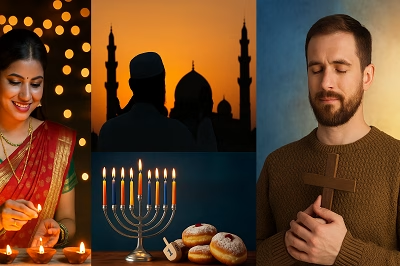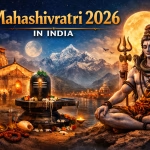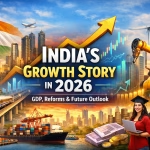Across the globe, people celebrate spiritual and religious festivals to express their faith, honor their beliefs, and build a sense of community. These festivals are not only sacred but also colorful, vibrant, and rich in tradition. From lighting lamps to dancing in the streets, every celebration has a unique story behind it.
In this blog, we’ll take a journey through some of the most famous spiritual and religious festivals observed worldwide.
1. Diwali – Festival of Lights (India)
Religion: Hinduism
Time of Year: October–November
Diwali is one of the most important Hindu festivals, celebrated with lamps, fireworks, sweets, and prayers. It symbolizes the victory of light over darkness and good over evil. Families clean their homes, worship Goddess Lakshmi, and share gifts with loved ones.
2. Christmas – Birth of Jesus Christ (Worldwide)
Religion: Christianity
Time of Year: December 25
Christmas celebrates the birth of Jesus Christ. It is marked with church services, carols, decorated trees, and gift-giving. People around the world, regardless of religion, join in the joyful spirit of peace, love, and giving.
3. Ramadan & Eid al-Fitr (Islamic World)
Religion: Islam
Time of Year: Varies (Based on lunar calendar)
Ramadan is a holy month of fasting, prayer, and reflection. Muslims fast from sunrise to sunset and focus on spiritual growth. It ends with Eid al-Fitr, a festival celebrated with feasts, new clothes, and giving to charity.
4. Hanukkah – Festival of Lights (Judaism)
Religion: Judaism
Time of Year: November–December
Hanukkah lasts for eight nights and honors the miracle of the oil that lasted in the temple. Families light the menorah, play traditional games, and eat foods like latkes (potato pancakes).
5. Vesak – Buddha’s Birthday (Asia)
Religion: Buddhism
Time of Year: April–May
Vesak marks the birth, enlightenment, and death of Gautama Buddha. Celebrations include temple visits, lighting lanterns, meditating, and acts of kindness. It’s a peaceful and respectful time for Buddhists worldwide.
6. Passover – Exodus Celebration (Jewish Community)
Religion: Judaism
Time of Year: March–April
Passover remembers the freedom of Israelites from Egyptian slavery. Families gather for the Seder meal, read religious texts, and avoid eating leavened bread as a sign of humility and tradition.
7. Navratri – Nine Nights of Worship (India)
Religion: Hinduism
Time of Year: September–October
Navratri celebrates the divine feminine power (Shakti). Each night is dedicated to a different form of the Goddess. Devotees fast, dance (Garba and Dandiya), and attend cultural events and rituals.
8. Hajj & Eid al-Adha (Islamic World)
Religion: Islam
Time of Year: Dhul-Hijjah (Islamic Calendar)
Hajj is the pilgrimage to Mecca, one of the five pillars of Islam. It ends with Eid al-Adha, which commemorates Prophet Ibrahim’s sacrifice. The festival involves prayers, sacrifices, and community meals.
9. Easter – Resurrection of Christ (Worldwide)
Religion: Christianity
Time of Year: March–April
Easter celebrates the resurrection of Jesus after his crucifixion. Christians attend church services and enjoy traditions like Easter eggs and feasts. It’s a symbol of hope and new life.
10. Thaipusam – Devotion and Penance (Tamil Communities)
Religion: Hinduism (Tamil culture)
Time of Year: January–February
Thaipusam is a festival of faith, penance, and gratitude to Lord Murugan. Devotees carry kavadis (decorated structures) and pierce their bodies in acts of devotion. It is mainly observed in India, Malaysia, and Singapore.
Conclusion
Spiritual and religious festivals connect people across cultures and continents. Whether it’s lighting a lamp, breaking a fast, or gathering in prayer, these moments create lasting memories and deep connections. They teach us values of peace, gratitude, sacrifice, and love—making the world a more united and meaningful place.
Our Latest Posts
- Top Technology Trends Transforming Indian Industries in 2026 (AI, Automation, Digital India & More)
- Mahashivratri 2026 in India
- India’s Growth Story in 2026: GDP, Reforms & Future Outlook
- Why the 2026 T20 World Cup Matters to India
- Bharat Taxi – India’s Emerging Ride – Hailing & Taxi Service Revolution
- LogiMAT India 2026 – The Ultimate Logistics & Supply Chain Expo in Mumbai







